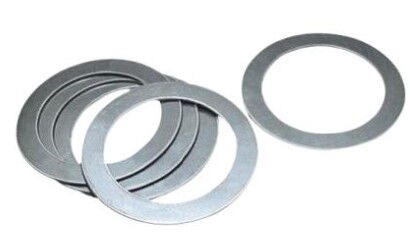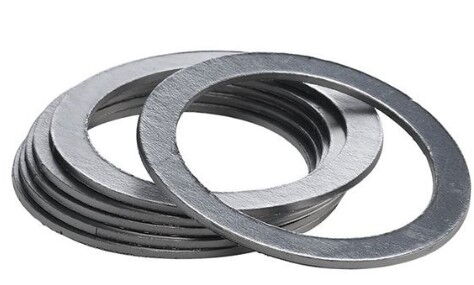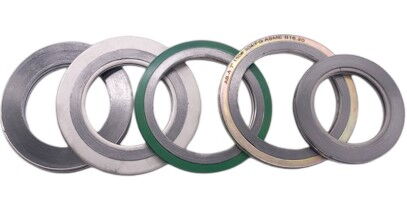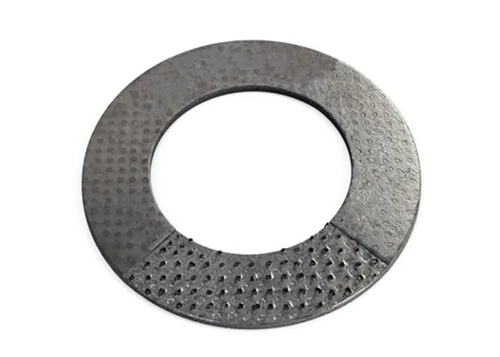In the operation of industrial equipment, sealing materials play a crucial role in ensuring the safety, efficiency, and cost-effectiveness of maintenance. Graphite gaskets, as a commonly used and highly efficient sealing component, have gained widespread application across various industries due to their excellent performance. Whether in high-temperature, high-pressure, or highly corrosive environments, graphite gaskets provide stable sealing effects, effectively preventing medium leakage and ensuring the smooth operation of equipment. With properties such as high-temperature resistance, corrosion resistance, and self-lubrication, graphite gaskets have become indispensable in industries like petrochemical, power generation, and mechanical manufacturing. They offer reliable sealing solutions by adapting to different working environments and conditions.
A graphite gasket is a sealing component made from graphite material, designed to prevent the leakage of gases, liquids, or steam at the junctions of industrial equipment. Graphite is highly valued for its excellent thermal stability, corrosion resistance, and self-lubricating properties, making it an ideal choice for environments subject to high temperatures, high pressures, and corrosive media. Graphite gaskets are commonly used in the flanged connections of pipes, pressure vessels, pumps, valves, and other equipment, making them essential for modern industrial operations.
The primary component of graphite gaskets is graphite, which may be natural or treated expanded graphite, or reinforced graphite. Based on the manufacturing process and the intended application, there are several types of graphite gaskets available, including pure graphite gaskets, flexible graphite gaskets, and composite graphite gaskets. Each type is designed to meet specific needs in various operational environments, providing flexibility in gasket selection based on the nature of the process.
Graphite gaskets are widely recognized in the sealing industry for their outstanding properties, which make them ideal for high-demand sealing applications. Below are some of the core advantages that graphite gaskets offer.
Graphite gaskets exhibit remarkable resistance to high temperatures, which is particularly evident in expanded graphite gaskets. These gaskets can withstand extreme temperatures, withstanding up to 450°C in the air and as high as 3650°C in inert gases. This exceptional heat resistance ensures that graphite gaskets can maintain their sealing properties even in high-temperature working environments, where other sealing materials would fail.
Graphite gaskets have excellent corrosion resistance, making them highly effective in environments exposed to strong acids, bases, and solvents. This makes them indispensable in industries such as chemical processing, petrochemicals, and pharmaceuticals, where sealing components are required to resist aggressive chemicals. The resistance of graphite gaskets to various corrosive media helps prevent leakage, which could otherwise lead to corrosion or damage to the equipment.
The molecular structure of graphite is layered, which gives the material its inherent self-lubricating properties. This self-lubrication reduces friction between the gasket and mating surfaces, which is especially important in high-pressure and high-temperature environments. By minimizing friction, graphite gaskets not only improve the lifespan of the equipment but also reduce the risk of mechanical damage caused by excessive wear.
Graphite gaskets are resistant to aging, unlike rubber and other sealing materials, which may become brittle, hardened, or degraded over time. This characteristic makes graphite gaskets particularly advantageous in long-term operations, where their sealing performance remains intact even after prolonged exposure to heat, pressure, and other environmental factors.
Graphite gaskets have excellent compression resilience, which means they can adapt to minor deformations in the flange and accommodate pressure fluctuations. Even when the flange faces experience changes in gap size due to temperature variations or pressure fluctuations, graphite gaskets can maintain reliable sealing performance. This resilience ensures that graphite gaskets provide continuous sealing throughout the service life of the equipment.
In addition to high-temperature and corrosion resistance, graphite gaskets also demonstrate good resistance to radiation. This property makes graphite gaskets particularly useful in industries such as nuclear power and aerospace, where equipment is subjected to radiation. In these applications, graphite gaskets can maintain stable sealing performance under extreme conditions, contributing to the safety and reliability of critical systems.
Graphite gaskets come in a variety of types, each designed to suit specific application requirements. The classification of these gaskets is based on their manufacturing process, material composition, and structural design. Understanding the different types of graphite gaskets and their characteristics is essential for selecting the appropriate gasket for specific operational conditions.
Pure graphite gaskets are made from natural graphite material and contain no additional metals or reinforcement. These gaskets are highly chemically stable and resistant to corrosion, making them ideal for sealing applications in low-pressure environments and at moderate temperatures. Pure graphite gaskets are often used in systems where temperature and pressure conditions are relatively low, as their flexibility allows them to fill gaps in slightly uneven flanges.

Flexible graphite gaskets are made by expanding natural graphite, which imparts greater flexibility, compressibility, and plasticity to the material. These gaskets are excellent for sealing pipe joints and equipment connections. Due to their ability to withstand a wide range of temperature and pressure fluctuations, flexible graphite gaskets are commonly used in demanding industries such as petrochemical and power generation, where high-performance sealing is critical.

Composite graphite gaskets consist of a core of graphite material surrounded by a metal layer, such as stainless steel or copper. These gaskets combine the benefits of graphite's corrosion resistance and the strength of metals, allowing them to withstand higher pressures and temperatures. Composite graphite gaskets are used in environments where extreme conditions, such as high pressure and temperature, prevail, and are commonly found in chemical processing, aerospace, and petrochemical industries.

Reinforced graphite gaskets are produced by incorporating metal wire mesh or foil into the graphite material to enhance its mechanical strength. These gaskets retain the excellent sealing properties of graphite while improving resistance to pressure, wear, and vibration. Reinforced graphite gaskets are ideal for use in extreme conditions, such as high-temperature, high-pressure environments or systems with substantial vibrations, providing a durable and long-lasting sealing solution.

Graphite gaskets are used in a wide range of industries, owing to their excellent performance characteristics. Below are some of the key industries and applications where graphite gaskets play a critical role.
The petrochemical industry is one of the largest fields for graphite gasket applications. In processes such as oil refining, chemical processing, and natural gas treatment, graphite gaskets effectively prevent leaks, ensuring the safety and efficient operation of systems. They are essential in refining, catalytic reactions, and gas transport.
In power generation, graphite gaskets are extensively used in boilers, heat exchangers, valves, and pipeline connections. They can withstand high-temperature and high-pressure environments while maintaining reliable sealing performance over extended periods. In nuclear power plants, graphite gaskets are indispensable due to their excellent radiation resistance.
In mechanical manufacturing, graphite gaskets are commonly used to seal pumps, compressors, valves, and condensers. Particularly in high-temperature, high-pressure, and corrosive environments, graphite gaskets ensure long-term, efficient operation and help reduce maintenance costs.
Graphite gaskets are also used in the food and pharmaceutical industries for sealing equipment and pipelines that require high hygiene standards. Because graphite is non-toxic and heat-resistant, it prevents contamination during the production of food or pharmaceuticals, ensuring product safety.
In water treatment, graphite gaskets are widely used in sealing systems of pumps, valves, and filters. They effectively prevent water contamination and ensure the stable operation of water treatment equipment.
Choosing the right graphite gasket for a specific application requires careful consideration of several factors, including temperature, pressure, media type, and flange characteristics. Below are key points to consider when selecting and installing graphite gaskets.
For high-temperature and high-pressure environments, it is advisable to choose composite or reinforced graphite gaskets. These gaskets are capable of withstanding higher external pressures and will ensure a reliable seal. For low-pressure applications, pure graphite or flexible graphite gaskets may be sufficient.
The type of media, such as acids, alkalis, or solvents, will determine the type of graphite gasket required. Gaskets with superior corrosion resistance are necessary when sealing in environments with aggressive chemicals. In chemical processes, the corrosion resistance of graphite gaskets is a key factor in ensuring long-lasting, effective seals.
When installing graphite gaskets, it is important to ensure that the flange surfaces are clean and smooth. Appropriate torque should be applied to avoid over-tightening or under-tightening, both of which can impair the gasket's sealing ability and potentially cause damage. It is advisable to follow the manufacturer's guidelines and installation manuals to ensure proper installation and optimal gasket performance.
Graphite gaskets have proven to be invaluable in industrial sealing applications due to their exceptional sealing properties and resistance to high temperatures, corrosion, radiation, and wear. From petrochemicals to power generation, aerospace to pharmaceuticals, graphite gaskets provide critical sealing solutions that ensure the efficient and safe operation of equipment. Selecting the appropriate gasket based on operational conditions and adhering to installation guidelines are essential steps in ensuring the longevity and performance of equipment. With their versatility and outstanding properties, graphite gaskets will continue to play a central role in industrial operations, ensuring high performance and reducing maintenance costs across a wide range of industries.